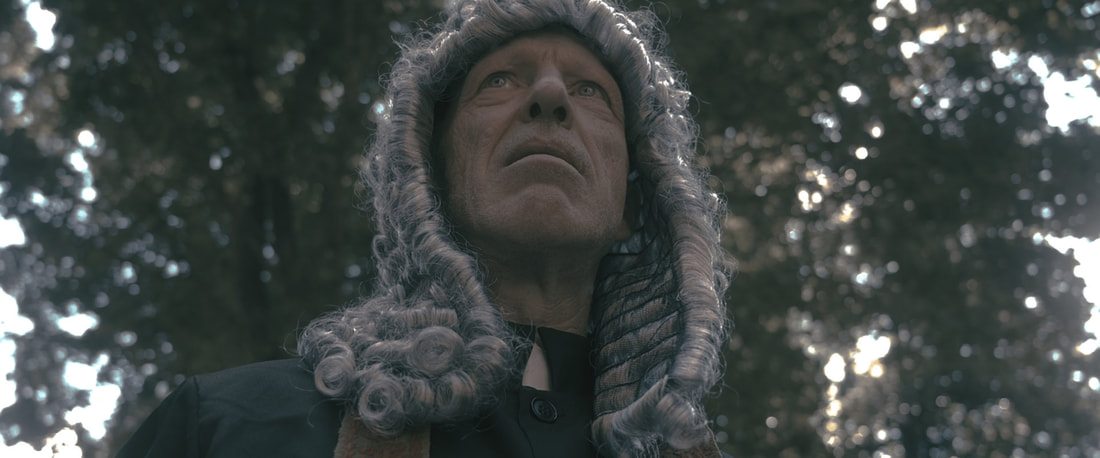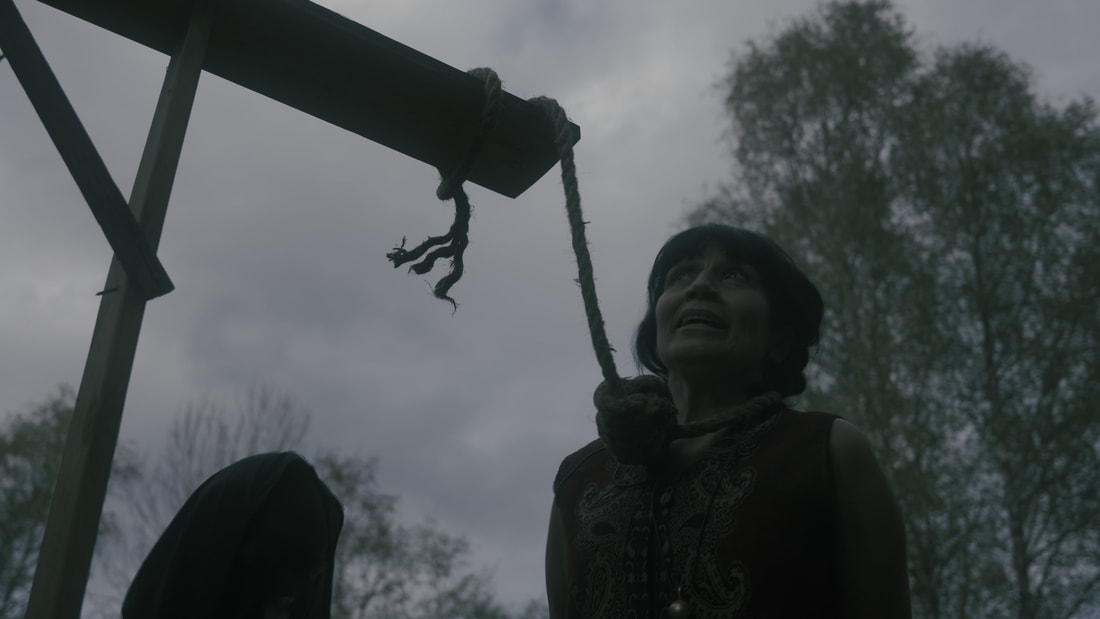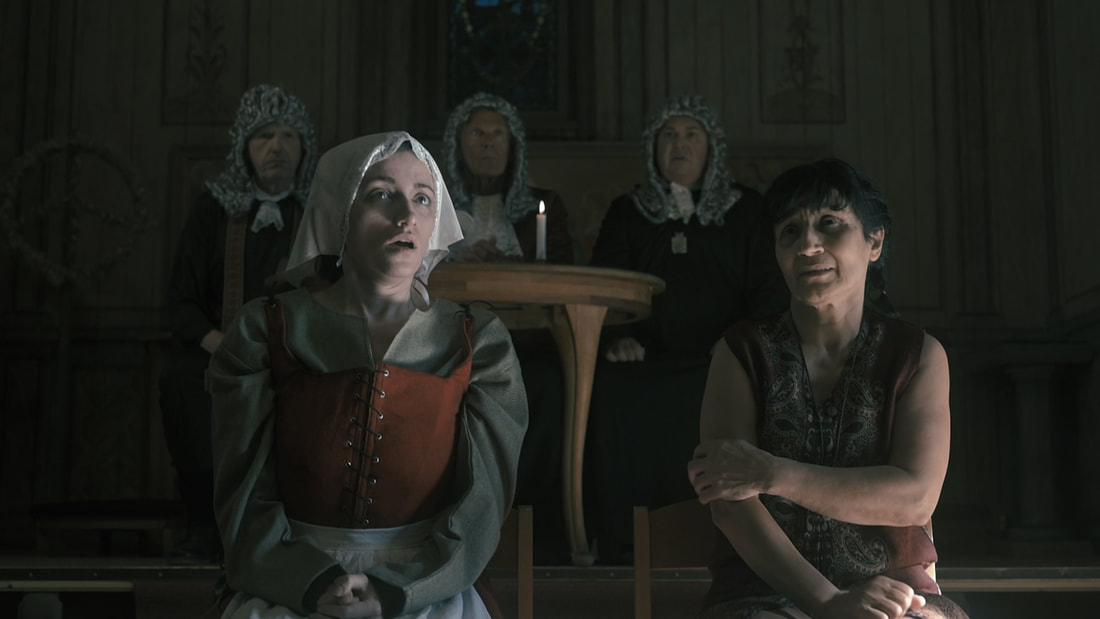|
JAYCE LANDBERG, DIRECTOR OF 'THE STORY OF TITUBA: HAPPY 4 U'
6-TIME NOMINEE BEST SHORT FILM, BEST ORIGINAL SCORE, BEST DRAMA, BEST HORROR/THRILLER, BEST COSTUME DESIGN In the shadows of history, there are characters whose stories remain shrouded in mystery, making them the perfect subjects for cinematic exploration. One such character is Tituba, the Native American woman accused of witchcraft in 1692 Salem Village. In Jayce Landberg's gripping film, "THE STORY OF TITUBA: Happy 4 U," the audience is taken on a thrilling journey to unravel the truth behind her confession and the subsequent events that followed. Garnering five nominations at the prestigious Lonely Wolf International Film Festival, including Best Short Film, Best Original Score, Best Costume Design, Best Drama and Best Horror/Thriller, this film has caught the attention of critics and viewers alike.
Landberg's directorial vision brings to life the tale of Tituba, a figure whose strong character and unwavering resilience have turned her into a symbol of inspiration for post-modern feminism. With an exceptional cast led by Anna Osadcha, a talented Ukrainian actress portraying Tituba, the film transcends its historical context to make a powerful statement about the importance of equality and the integration of minorities. A collaborative effort that crosses borders and unites individuals of diverse ethnicities and nationalities, "THE STORY OF TITUBA: Happy 4 U" showcases the talents of Niall Balfe as the Magistrate, Nils Westman as Samuel Parris, and even Landberg himself in the role of an unknown man. This compelling piece of art combines the genres of documentary, thriller, drama, and history to craft a riveting narrative that sheds light on a lesser-known aspect of the infamous Salem witch trials. Join us as we delve deeper into the creative process behind this groundbreaking film with our exclusive interview with Jayce Landberg, the visionary director, writer, and producer who brought Tituba's story to the screen. What inspired you to make this film? Can you share a little about the genesis of the idea? I am a big fan of documentaries, and while watching one about the Salem witch trials, I was drawn to Tituba's persona. Not much was known about her, and she remained more or less unknown. She intrigued me in such a way that I wanted to tell her story, so I wrote the song "Happy 4 U" around what happened to her. The movie is basically based on that song. How did you approach the subject matter of this film? What research or preparatory work was involved? I approached it as much as a documentary as I could, even though the film is partly thriller, partly music video. The research involved behind it allowed me to make it as historically accurate as one could. I got hold of a copy of the original transcripts from the actual interrogation of Tituba, and the questions and answers depicted in the film are all accurate. Can you share some of the challenges you faced during the production of this film? How did you overcome them? The main challenge obviously was the production design. I searched and went through many churches until I found one old wooden church designed as a 17th-century church. My partner Lina Ellenberg designed and manufactured principal costumes, including mine, while I hunted for the rest. Another challenge was also to convince the church to let us rent it. Your film has been described as "powerful" and "innovative". What do you believe gives it this quality? Was this something you consciously worked towards? Thank you. I think the film turns out to be innovative in its genre. This format has never really been made before, not in such a linear way anyway. As far as the quality goes, I am very picky and demanding with myself as well as the people I work with, so it's always a conscious effort to reach the absolute best quality that I possibly can. Can you discuss some of the important themes and messages you wanted to convey through this film? My attempt was to address the notion of injustice and social corruption. Themes such as racism and power abuse are also present but not without an ounce of humor as well. |
|
- About
-
News Journal
- Press Releases >
- Film Reviews >
- Screenplay Feedback
-
Interviews
>
-
| 2023 |
>
-
SPRING CLASSIFIERS (28 APR)
>
- A SPECIAL BREAKFAST (Germany) · Savo Cubrilovic, Sarah Timm
- MAHOGANY (USA) · Allana De'nai
- THE STORY OF TITUBA: HAPPY 4 U (Sweden) · Jayce Landberg
- WE THE PEOPLE? (USA) · Sai Man (Simon) Zhao
- WHEN BUYING A FINE MURDER (Italy) · Gabriele Tacchi
- DON'T CRY (Germany) · Hisham Zreiq
- TROLLED (USA) · John F. Uranday
-
SPRING CLASSIFIERS (28 APR)
>
- | 2022 | >
-
| 2023 |
>
-
Competition Results
- | 2023 |
- WINTER CLASSIFIERS (21 DEC) >
- SUMMER CLASSIFIERS (31 JUL) >
- SPRING CLASSIFIERS (28 APR) >
- | 2022 |
- WINTER FEST (23-31 Dec) >
- SUMMER FEST (10-14 AUG) - ALL FINALISTS
- SPRING FEST (29 APR-7 MAY) - ALL FINALISTS
- | 2021 |
- WINTER FEST (16-26 DEC) - ALL FINALISTS
- SUMMER FEST (30 JUL-8 AUG) - ALL FINALISTS
- SPRING FEST (27 MAR-4 APR) - ALL FINALISTS
- | 2020 |
- WINTER 2020 FEST (15-31 DEC) - ALL FINALISTS
- AUTUMN 2020 FEST (30 SEP-4 OCT) - ALL FINALISTS
- SUMMER 2020 FEST (22-26 JUL) - ALL FINALISTS
-
Digital Cinema
- | 2023 |
- WINTER FEST (21-31 Dec)
- | 2022 |
- 🔒 WINTER FEST (23-31 Dec)
- 🔒 SUMMER FEST (10-14 AUG)
- 🔒 SPRING FEST (29 APR-7 MAY)
- | 2021 |
- 🔒 WINTER FEST (16-26 DEC)
- 🔒 SUMMER FEST (30 JUL-8 AUG)
- 🔒 SPRING FEST (27 MAR-4 APR)
- | 2020 |
- 🔒 WINTER 2020 FEST (15-31 DEC)
- 🔒 AUTUMN 2020 FEST (30 SEP-4 OCT)
- 🔒 SUMMER 2020 FEST (22-26 JUL)
- SUBMIT NOW
|
© 2020 Lonely Wolf, member of FILMFINITY SL. All Rights Reserved.
|



